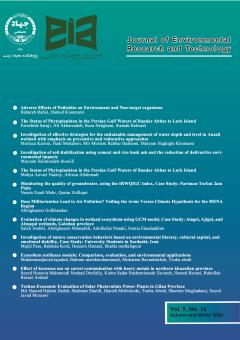Investigation of soil stabilization using cement and rice husk ash and the reduction of destructive environmental impacts
Subject Areas : environmental economy
1 - Assistant Professor, Department of Civil Engineering, Faculty of Engineering, University of Guilan, Iran
Keywords: Stabilization, Improvement, Pozzolan, Rice Husk Ash,
Abstract :
Given the necessity of using renewable and environmentally friendly materials, this study provides a comprehensive investigation into rice husk ash (RHA) as a sustainable substitute for cement. RHA was selected due to its unique properties, including high pozzolanic activity, abundant availability, easy accessibility in the region, low production cost, and environmental advantages. In this study, following a review of the history and principles of soil stabilization, the production and curing process of RHA at controlled temperatures was examined. The chemical and morphological characteristics of RHA were assessed using advanced laboratory techniques such as X-ray diffraction (XRD) and scanning electron microscopy (SEM). The findings indicate that replacing 20% to 30% of cement with RHA results in achieving compressive strengths approximately 90% to 95% that of control samples. Moreover, using RHA as a natural pozzolan not only enhances the geotechnical properties of soil—such as increasing shear strength and reducing swelling potential—but also leads to a 40% to 45% reduction in cement consumption. This, in turn, results in an approximate reduction of 0.5 tons of CO₂ emissions per ton of replaced cement. From an environmental standpoint, the application of RHA not only addresses the issue of agricultural waste disposal but also constitutes an effective step toward sustainable development and the preservation of natural resources.
